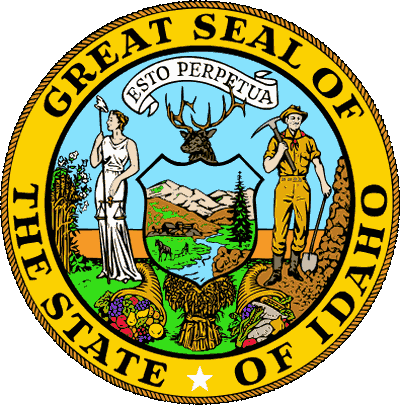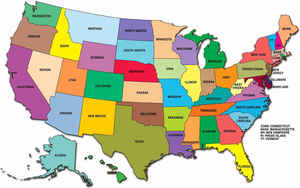- » 50 States
- » Histories
- » State Symbols
- » Seals
Idaho State Seal
Great Seal of the State of Idaho

Adopted in March 14, 1891; 1957.
The Seal of the Territory of Idaho was adopted in 1863, and redrawn several times before statehood in 1890.
Idaho has the only Great Seal designed by a woman, Emma Edwards Green at the period when she designed the Great Seal for the State of Idaho. The only woman ever to achieve such distinction in the United States, she won in competition sponsored by the First Legislature for the State of Idaho. She was handed the honorarium by Governor Norman B. Willey on March 5, 1891.
Idaho Great Seal
.jpg) SEAL FOR IDAHO TERRITORY 1863
SEAL FOR IDAHO TERRITORY 1863
No official record remains of the adoption of the first Great Seal of Idaho when it became a territory in 1863. The design is attributed to Silas D. Cochran, a clerk in the office of the Secretary of State.
IDAHO'S FINAL SEAL BEFORE STATEHOOD 1890

Dissatisfaction with the official seal caused Governor Caleb Lyon to present a seal of his own design which was accepted by the Idaho Territorial Legislature on January 11, 1866. This, too, was controversial and was redrawn several times. Nevertheless, it was used until Idaho became a state in 1890.
STATE SEAL NOW of 1957
In 1957, the thirty-fourth session of the Idaho legislature authorized the updating and improvement of the Great Seal in order to more clearly define Idaho's main industries, mining, agriculture and forestry as well as highlight the state's natural beauty. Paul B. Evans and the Caxton Printers, Ltd. were commissioned to revise the seal. This painting by Paul B. Evans officially replaced the original design by Emma Edwards Green and is designated as the "Official Copy." The official Great Seal of the State of Idaho can be seen in the office of the Secretary of State.The seal depicts a miner and a woman representing equality, liberty and justice. The symbols on the seal represent some of Idaho's natural resources: mines, forests, farmland, and wildlife.
The current seal contains the text "Great Seal of the State of Idaho" in the outer ring, with the star that signifies a new light in the galaxy of states. The inner ring contains a banner with the Latin motto, Esto perpetua ("Let it be perpetual" or "It is forever"). A woman, signifying justice, and a man, dressed as a miner, support a shield. The miner reminds us of the chief industry of the State at the time of statehood.
Inside, the shield bears images symbolic of the State. The pine tree in the foreground refers to Idaho's immense timber interests. The husbandman plowing on the left side of the shield, together with the sheaf of grain beneath the shield, are emblematic of Idaho's agricultural resources, while the two cornucopias, or horns of plenty, refer to the horticultural. Idaho has a game law, which protects the elk and moose, and an elk's head rises above the shield. The state flower, the wild Syringa or Mock Orange, grows at the woman's feet, while the ripened wheat grows as high as her shoulder. The river depicted in the shield is the Snake or Shoshone River.
Idaho Statutes
TITLE 59
PUBLIC OFFICERS IN GENERAL
CHAPTER 10
MISCELLANEOUS PROVISIONS
59-1005. GREAT SEAL OF STATE. The design drawn and executed by Miss Emma Edwards,
of Boise City, and reported and recommended by the select joint committee to devise a great seal for the state, with the Latin motto "Esto Perpetua,"
is adopted, and is hereby made the great seal of the state of Idaho. The painting shall serve as the model as to color and form for the center of the
seal. The five-pointed star in the painting shall be within a border encircling the painting. Within the border shall be the words: Great Seal of the
state of Idaho. The secretary of state, with the approval of the state board of examiners, shall have designed the appropriate encircling border and
wording as herein set forth and shall have the same superimposed on a fully colored reproduction of the painting. This, when completed, shall be designated
as the "Official Copy" of the great seal of the state of Idaho and shall be maintained in the office of the secretary of state.
History:
[(59-1005) 1890-1891, p. 215, sec. 1; reen. 1899, p. 147, sec. 1; am. R.C., sec. 337; reen. C.L., sec. 475; I.C.A., sec. 57-1005; am. 1957, ch. 238,
sec. 1, p. 568.]
59-1005A. AUTHORSHIP AND DESCRIPTION OF GREAT SEAL OF STATE. The inscription of authorship of the great seal of state shall appear
as follows: 1891 EMMA EDWARDS GREEN - PAUL B. EVANS rev. 1957. The new inscription shall be located in the same place and manner as the previous inscription,
using more space as is necessary. In gratitude for and as a tribute to Emma Edwards Green for her design of the Idaho state seal is her description
of the seal in her own words:
"Before designing the seal, I was careful to make a thorough study of the resources and future possibilities of the state. I invited
the advice and counsel of every member of the legislature and other citizens qualified to help in creating a seal of state that really represented
Idaho at that time. Idaho had been admitted into the Union on July 3rd, 1890, and on March 14, 1891, adopted my design for the great seal of the state
of Idaho. The question of woman suffrage was being agitated somewhat, and as leading men and politicians agreed that Idaho would eventually give women
the right to vote, and as mining was the chief industry, and the mining man the largest financial factor at that time, I made the figure of the man
the most prominent in the design, while that of the woman, signifying justice, as noted by the scales; liberty, as noted by the liberty cap on the
end of the spear, and equality with man as denoted by her positions at his side, also signifies freedom. The pick and shovel held by the miner, and
the ledge of rock beside which he stands, as well as the pieces of ore scattered about his feet, all indicate the chief occupation of the state. The
stamp mill in the distance, which you can see by using a magnifying glass, is also typical of the mining interest of Idaho. The shield between the
man and woman is emblematic of the protection they unite in giving the state. The large fir or pine tree in the foreground in the shield refers to
Idaho's immense timber interests. The husbandman plowing on the left side of the shield, together with the sheaf of grain beneath the shield, are emblematic
of Idaho's agricultural resources, while the cornucopias, or horns of plenty, refer to the horticultural. Idaho has a game law, which protects the
elk and moose. The elk's head, therefore, rises above the shield. The state flower, the wild Syringa or Mock Orange, grows at the woman's feet, while
the ripened wheat grows as high as her shoulder. The star signifies a new light in the galaxy of states. ... The river depicted in the shield is our
mighty Snake or Shoshone River, a stream of great majesty. In regard to the coloring of the emblems used in the making of the great seal of the state
of Idaho, my principal desire was to use such colors as would typify pure Americanism and the history of the state. As Idaho was a virgin state, I
robed my goddess in white and made the liberty cap on the end of the spear the same color. In representing the miner, I gave him the garb of the period
suggested by such mining authorities as former United States Senator George Shoup, of Idaho, former Governor Norman B. Willey of Idaho, former Governor
James H. Hawley of Idaho, and other mining men and early residents of the state who knew intimately the usual garb of the miner. Almost unanimously
they said, "Do not put the miner in a red shirt." "Make the shirt a grayish brown," said Captain J.J. Wells, chairman of the seal committee. The "Light
of the Mountains" is typified by the rosy glow which precedes the sunrise."
History:[59-1005A, added 1994, ch. 444, sec. 1, p. 1425.]
Idaho Session Laws
STATE SEAL
Idaho Session Laws, 1890 1891, pages 215 216.
AN ACT PROVIDING A GREAT SEAL FOR THE STATE OF IDAHO.
WHEREAS in compliance with a concurrent resolution adopted by the legislature, a joint committee of both houses has devised and recommended a great
seal for the State of Idaho, and submitted the same to the legislature for its approval. Therefore,
Be it Enacted by the Legislature of the State of Idaho:
Section 1. That the design drawn and executed by Miss Emma Edwards, of Boise City, and reported and recommended by the select joint committee to devise
a great seal for the State with the Latin motto "Esto Perpetua," be adopted, and is hereby made the great seal of the State of Idaho.
Approved March 14, 1891.








